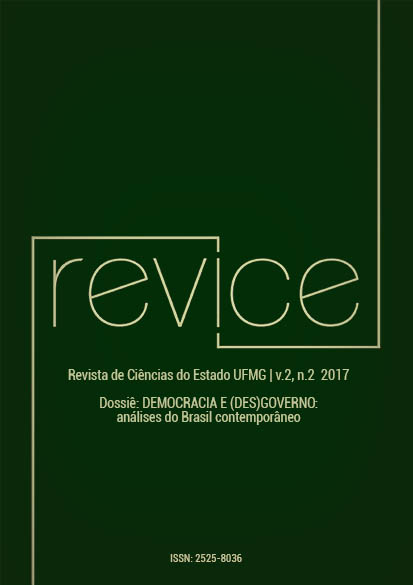Democracia, Estado y lucha contra la corrupción en el pensamiento político y judicial de Sérgio Fernando Moro
DOI:
https://doi.org/10.35699/2525-8036.2017.5046Palabras clave:
Sergio Moro, Ideologia, Pensamiento político, Poder judicialResumen
Este trabajo analiza la formación del pensamiento político del juez federal Sergio Fernando Moro a partir de cuatro artículos escritos por él, así como de la traducción de la obra de un fiscal norteamericano, entre 1999 y 2008, período en el que se segmentó en el poder judicial como juez especializado en casos de crimen organizado, corrupción y lavado de dinero. La síntesis de la comparación de los trabajos muestra cómo el juez formó un pensamiento político en el que el Poder Judicial debe superponerse a los demás poderes republicanos, porque, para él, la fuente de toda corrupción proviene de la política y de la administración pública, que son capturadas por malhechores que ocupan cargos en los poderes Legislativo y Ejecutivo. De esta forma, la propia naturaleza del cargo y de los procesos de selección de méritos en concurso público otorga al juez el poder de reinterpretar las leyes, sustituir las obligaciones legales por argumentos morales y suplantar las pruebas indiciarias por el apoyo de la "opinión pública".
Descargas
Referencias
BERCOVICI, Gilberto. Constituição e Estado de Exceção Permanente: atualidade de Weimar. Rio de Janeiro: Azougue, 2004.
CERQUEIRA, Marcello. A Constituição na História – Origem e Reforma: da Revolução Inglesa de 1640 à crise do Leste Europeu. 2.ed. revista e ampliada até a EC 52/2006. Rio de Janeiro: Revan, 2006.
CHAUÍ, Marilena. Uma ideologia perversa. Folha de S. Paulo, São Paulo, 14 de setembro de 1999, pp. 3-5.
LOSURDO, Domenico. Democracia ou Bonapartismo. São Paulo: Editora Unesp, 2004.
MARTINS, Cristiano Zanin; MARTINS, Valeska Teixeira Zanin; VALIM, Rafael. O caso Lula – A luta pela afirmação dos direitos fundamentais no Brasil. São Paulo: Contracorrente, 2016.
MARX, Karl. Crítica da Filosofia do Direito de Hegel. São Paulo: Boitempo, 2010.
____________. O Capital – Crítica da Economia Política– Livro I – O processo de Produção do Capital. Rio de Janeiro: Civilização Brasileira, 2004.
MARX, Karl; ENGELS, Friederich. A ideologia alemã. São Paulo: Boitempo, 2007.
MÉSZÁROS, István. Estrutura Social e Formas de Consciência – A determinação Social do Método. São Paulo: Boitempo, 2009.
____________. O Poder da Ideologia. São Paulo: Boitempo, 2004, 567p.MORO, Sergio Fernando. Afastamento da presunção de constitucionalidade da lei. In: Revista CEJ, Brasília, v. 3, n. 7, jan./abr. 1999. Disponível em: <https://goo.gl/gRrgkH>. Acesso em 19 abr. 2016.
____________. Autonomia do crime de lavagem e prova indiciária. In: Revista CEJ, Brasília, v. 12, n. 41 abr./jun. 2008, pp. 11-14.
____________. Considerações sobre a Operação Mani Pulite. In: Revista CEJ, Brasília, v. 8, n. 26, p. 56-62, jul./set. 2004, pp. 56-62.
____________. Por uma revisão da teoria da aplicabilidade das normas constitucionais. In: Revista CEJ, Brasília, v. 4 n. 10 jan./abr. 2000. Disponível em: < https://goo.gl/s5mtsE>. Acesso em 19 abr. 2016.
SERRANO, Pedro Estevam Alves Pinto. Autoritarismo e Golpes na América Latina – Breve Ensaio sobre Jurisdição e Exceção. São Paulo: Alameda, 2016.
TROTT, Stephen S. O uso de um criminoso como testemunha: um problema especial.
MORO, Sergio Fernando (trad.). In: Revista CEJ, Brasília, v. 11, n. 37, abr./jun. 2007, pp. 68-93.
ZAFFARONI, Eugenio Raúl. O inimigo no direito penal. 3. ed. Rio de Janeiro: Revan, 2011.
ZAVERUCHA, Jorge. “Relações civil-militares: o legado autoritário da Constituição Brasileira de 1988”. In: TELLES, Edson; SAFATLE, Vladimir (orgs.). O que resta da ditadura. São Paulo: Boitempo, 2010, p. 41-76.
Descargas
Publicado
Número
Sección
Licencia
Derechos de autor 2017 Fabio Cesar Venturini

Esta obra está bajo una licencia internacional Creative Commons Atribución-NoComercial-CompartirIgual 4.0.
1. Os conteúdos dos trabalhos são de exclusiva responsabilidade de seu autor.
2. É permitida a reprodução total ou parcial dos trabalhos publicados na Revista, desde que citada a fonte.
3. Ao submeterem seus trabalhos à Revista os autores certificam que os mesmos são de autoria própria e inéditos (não publicados em qualquer meio digital ou impresso).
4. Os direitos autorais dos artigos publicados na Revista são do autor, com direitos de primeira publicação reservados para este periódico.
5. Para fins de divulgação, a Revista poderá replicar os trabalhos publicados nesta revista em outros meios de comunicação como, por exemplo, redes sociais (Facebook, Academia.Edu, etc).
6. A Revista é de acesso público, portanto, os autores que submetem trabalhos concordam que os mesmos são de uso gratuito.
7. Constatando qualquer ilegalidade, fraude, ou outra atitude que coloque em dúvida a lisura da publicação, em especial a prática de plágio, o trabalho estará automaticamente rejeitado.
8. Caso o trabalho já tenha sido publicado, será imediatamente retirado da base da revista, sendo proibida sua posterior citação vinculada a ela e, no número seguinte em que ocorreu a publicação, será comunicado o cancelamento da referida publicação. Em caso de deflagração do procedimento para a retratação do trabalho, os autores serão previamente informados, sendo-lhe garantido o direito à ampla defesa.
9. Os dados pessoais fornecidos pelos autores serão utilizados exclusivamente para os serviços prestados por essa publicação, não sendo disponibilizados para outras finalidades ou a terceiros.



